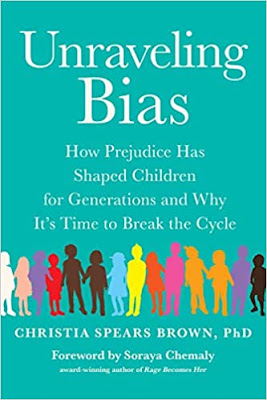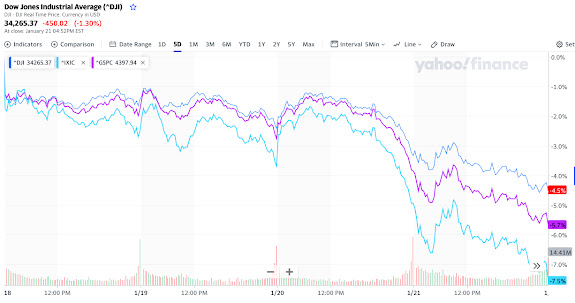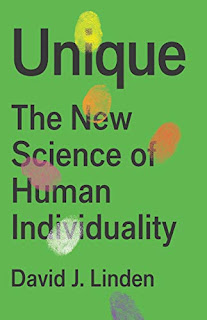SCOTUS could soon say "yes."


[Kim Wehle] Today, the Supreme Court will hear oral argument in a pair of cases challenging President Joe Biden’s vaccine mandates in two contexts: private workplaces with more than 100 employees and health-care facilities that participate in Medicare and Medicaid.
Ostensibly, these cases are before the Court to resolve whether a president can even temporarily require vaccine and testing protocols during a pandemic to protect public health. But the questions the Court may examine are much more sweeping, with enormous implications for the future of the executive branch and the massive swaths of American life it regulates.
Article I of the Constitution establishes that “all legislative Powers herein granted shall be vested in a Congress of the United States,” but it doesn’t define “legislative powers” except to suggest that they are something other than the nominal, undefined powers granted to the other two branches of the federal government—the president’s “executive Power” under Article II and the federal courts’ “judicial Power” under Article III. As a practical matter, legislative or “lawmaking” power might be defined as writing rules that operate prospectively to constrain conduct…
OK, let's stop right there for the moment. My wife and I have spent our entire decades-long white collar careers working in heavily-federally regulated business environments: EPA, DOE, DOD, OSHA, HHS / CMS, OCC, and FDIC. I have slogged through innumerable "proposed regulations"—i.e. the NPRM ("Notice of Proposed Rulemaking") Code of Federal Regulations (CFR) first-cut submissions (published in the Federal Register ongoing).
Statutory law and regulation bring to mind a rather precise and relevant business analogy. Bills that pass and become law provide us with the "what" and the "why." Think "Corporate Policies" documents (that we usually ignore—those ugly-assed 2" binders on the shelves). Within the laws we find stipulations pertaining to the "regulations," which comprise the "who," "how," "where", and "when" things get done to comply with the laws (or company policies). The "procedures." I've written my share.
Open any law on the books. Search for phrases like "as the Secretary shall implement by regulation."
You will find buku. It's a long-standing conventional staple of legislative promulgation. The who-how-where-when ops particulars largely get delegated to the myriad Article II federal agencies wherein reside the boots-on-the-ground relevant experts. Draft regulations undergo lengthy and detailed "pubic review and comment" periods prior to being finalized and added to the CFR.
This reality is by no means an unalloyed good. to wit, Obamacare contains more than 1,000 such phrases. I recall thinking at the time "be careful what you ask for."
One last thought for now on federal CFRs. Their scopes are constrained to stay within the "intent" of the enabling legislation. Where they exceed their briefs, they are routinely challenged in court, and may well be nullified or otherwise appropriately circumscribed. That's how the system works. Yeah, it's tedious and boring. As the late Betty White would've said, "deal with it."
Moreover, federal agencies nominally answerable to the Executive Branch don't sit around thinking up random stuff to unilaterally regulate. C'mon.
So, to wrap for now. Is the Article III Branch about to declare that the Article I Branch cannot delegate via legislation the ops particulars (via statutory regulations) to the Article II Branch?
Probably not, in the aggregate. But, the Camel's Nose lurks at the edge of the tent nonetheless.
When Donald Trump took office five years ago, White House chief strategist Stephen K. Bannon vowed that the new president would wage an unending battle for the “deconstruction of the administrative state.”
The Supreme Court’s apparent readiness to block President Biden’s vaccine mandate for large companies, which will otherwise go into effect Monday, underscores the likelihood that Trump’s legacy, by remaking the judiciary, will include declawing the federal bureaucracy and hollowing out its regulatory authorities…
Solicitor General Elizabeth B. Prelogar, representing the Biden administration, told the justices that they are wrong to pretend Congress must renew authorities that have already been deferred to the executive branch, in this case to protect workers from “grave risk.” Covid “is the biggest threat to workers in OSHA’s history,” Prelogar said.
This gets to the nub of a deeper ideological dispute that reflects how the court is changing. It involves a lot more than OSHA or the polarized politics of vaccination. The unusual 3½ hours of arguments felt like the culmination of a multi-decade effort to tie the hands of a range of career civil servants inside alphabet-soup agencies such as the Environmental Protection Agency.
The right’s frustrations are understandable. The administrative state has swelled over the past century, repeatedly using broadly worded laws to issue far-reaching regulations that are often quite costly.
The left also has grounds to worry. Historically, and almost definitionally, a gridlocked Congress that cannot pass laws tends to be better for conservative reactionaries than progressive activists. Lawmakers also lack the mastery of esoteric issues, say soil runoff, that civil servants can master. When the courts force Congress to expressly decide, usually either nothing happens — or lobbyists sit in the driver’s seat…
We already have a problem with lobbyists and astroturfers hawking partisan "model legislation." I don't think we want them writing the regulations—the
who-how-where-when procedures—that would have to be included in original bills passed into law should SCOTUS strike down the current Article I/II process.
Back to Kim Wehle:
The crucial legal question in the cases now before the Supreme Court is less about whether Biden properly exercised the authority granted to him in these acts than whether Congress acted constitutionally in passing along the authority to the executive branch to make such rules in the first place. If the Supreme Court’s conservative majority decides that that delegation was improper (a position that certain justices appear to have endorsed), a cascade of deregulation could begin, reversible only with a formal amendment to the Constitution or a new majority on the Court, both of which are all but impossible in the foreseeable future…
If Congress is hindered in its ability to employ agencies to fill in the details of its broad mandates, life in the United States could change dramatically. Agencies make rules and regulations affecting stock markets, consumer-product safety, the use and trafficking of firearms, environmental protection, workplace discrimination, agriculture, aviation, radio and television communications, financial institutions, federal elections, natural gas and electricity, the construction and maintenance of highways, imports and exports, human and veterinary drugs, and even the licensing and inspection of nuclear-power plants…
Jus' sayin'...
BTW, highly recommend her book.

Next month, the Supreme Court will hear oral arguments in a case involving an Obama-era power-plant rule that’s no longer in effect, and never really was. The Court has agreed to hear so many high-profile cases this term, on subjects ranging from abortion to gun rights to vaccine mandates, that this one—West Virginia v. Environmental Protection Agency—has received relatively little attention beyond legal circles. But its potential ramifications are profound. At a minimum, the Court’s ruling on the case is likely to make it difficult for the Biden Administration to curtail greenhouse-gas emissions. The ruling could also go much further and hobble the Administration’s efforts to protect the environment and public health.
West Virginia v. E.P.A. “could well become one of the most significant environmental law cases of all time,” Jonathan H. Adler, a law professor at Case Western Reserve University and a prominent conservative commentator, wrote on the legal blog the Volokh Conspiracy. Or, as Ian Millhiser put it, for Vox, “West Virginia is a monster of a case.”…
Under Donald Trump, the E.P.A. scrapped the Clean Power Plan and replaced it with what it called the Affordable Clean Energy rule, or ace. ace called on coal-fired power plants to install new equipment to increase their efficiency, an approach that some researchers concluded would have actually increased greenhouse-gas emissions by causing more coal, over all, to be burned. In issuing the regulation, the Trump Administration insisted that the E.P.A. didn’t have the authority to issue the Clean Power Plan in the first place. Democrat-led states took the Trump Administration to court, and, the day before Joe Biden’s Inauguration, the U.S. Court of Appeals for the D.C. Circuit struck down ace, saying that it was based “on a mistaken reading of the Clean Air Act.” The Clean Air Act, the court said, did give the E.P.A. broad latitude to decide what the “best system” would be…
At the center of the consolidated case is the question of whose interpretation of the E.P.A.’s authority under Section 111(d) of the Clean Air Act is correct: the Obama Administration’s or Trump’s—or, if you prefer, blue states’ attorneys general’s or red states’. But the case, which has attracted amicus briefs from a Death Star’s worth of right-wing think tanks, could become the start of something much bigger. Vickie Patton, the general counsel to the Environmental Defense Fund, one of the many respondents in the case, said that the petitioners are “asking the Court to do far-reaching damage to all sorts of ways we protect human life: by regulating food safety, car safety, deadly pollution, and so on.” She added, “There’s an enormous amount at stake for the American people.”…
The petitioners and their “friends” filed their briefs in the case last month. (Strikingly, several major utility companies, including Con Ed and National Grid, have joined with environmental groups, such as E.D.F., and blue states, such as New York and California, to oppose the petitioners.) Many of the briefs range far beyond the question of how to read Section 111(d) and seem aimed at what the former Trump adviser Steve Bannon famously called the “deconstruction of the administrative state.” (One of the briefs was co-authored by John Eastman, the lawyer who wrote the memo for the Trump legal team that urged Vice-President Mike Pence to overturn the results of the 2020 election.) Several invoke what’s become known as the “major questions” doctrine, which is popular among conservative jurists, including, notably, Justices Brett Kavanaugh and Neil Gorsuch….
According to the major-questions doctrine, an agency can issue a regulation that would have significant political or economic ramifications only if it has explicit instructions from Congress to do so. Major questions is a challenge to the prevailing approach, known as the Chevron doctrine, which is named after a case—Chevron U.S.A., Inc. v. Natural Resources Defense Council—that was decided by the Supreme Court in 1984. Chevron holds that, if a statute is silent or ambiguous on a point, the courts should defer to an executive agency’s interpretation, as long as the interpretation is reasonable.
The Chevron doctrine is critical to government regulation as we know it: often, federal rules are written in response to broad directives from Congress to, say, protect air quality or worker safety. The Biden Administration’s mandate that companies with a hundred or more employees require workers to be vaccinated against covid or tested weekly, for instance, relies on the Occupational Safety and Health Act of 1970. For obvious reasons, the act never mentioned covid. Last week, when the Supreme Court heard arguments in two cases challenging the Biden Administration’s authority to issue vaccine mandates, Justices Kavanaugh and Gorsuch raised the major-questions doctrine. Critics of major questions point out that, if the Court were to favor this doctrine and abandon or curtail Chevron—a move that, after last week’s arguments, seems increasingly likely—it would, in effect, be stripping power from the executive branch and handing it over to itself. “At a moment when conservatives are likely to control the Court for at least a generation, they don’t need to win congressional or presidential elections to ensure a perpetual veto over federal policy,” Hannah Mullen, a staff attorney at Georgetown Law’s Appellate Courts Immersion Clinic, wrote recently on the legal Web site Balls & Strikes.
Several of the parties to the West Virginia case go beyond the major-questions doctrine to argue in favor of what has become known as the “non-delegation” doctrine. According to this way of thinking, Congress is barred by the Constitution from delegating powers that could be construed as legislative to the executive branch. In the nineteen-thirties, the Court relied on non-delegation to strike down provisions of some of F.D.R.’s early initiatives. The idea has basically lain dormant since 1935, but in recent years several Justices—including Gorsuch and Clarence Thomas—have indicated a desire to revive it, though what exactly this would mean, ninety years after the New Deal, is unclear. As Justice Elena Kagan noted, in a 2019 decision, non-delegation has the potential to render most of contemporary government unconstitutional, “dependent as Congress is on the need to give discretion to executive officials to implement its programs.”…
Jus' sayin'
...[T]he Supreme Court is actually the worst of the four options when it comes to creating the country’s vaccine policy. Regular people can’t file comments with the Court on a proposed ruling and thereby put their views before the decision maker, as it can when an agency finalizes a regulation after a process known as “notice and comment” decision making. Nor can voters lobby Supreme Court justices for favorable policies as they can, at least in theory, with elected members of Congress. Unlike with legislation, moreover, there’s no way for the regulated community or those affected to know whether these “lawmakers” in robes would condone a revised vaccine regulation, other than for OSHA to enact a new one and litigate it all the way to the top for a stamp of approval. When judges—rather than Congress or administrative agencies—task themselves with filling in the blanks inevitably left in legislation, the people have little guidance in the interim…
Breyer saw it that way too. And he didn’t like it: “And then, there is this Court. Its Members are elected by, and accountable to, no one. And we lack the background, competence, and expertise to assess workplace health and safety issues. When we are wise, we know enough to defer on matters like this one. When we are wise, we know not to displace the judgments of experts, acting within the sphere Congress marked out and under Presidential control, to deal with emergency conditions. Today, we are not wise.”
Welcome to the new America, friends. Where the new boss of all bosses is not a king, or a president, or even Congress. It’s five or more elite legal minds with more unaccountable power than anyone—and with very strong opinions about what the law should be.
___
MORE GREAT NEW READS
"Truth Decay" is meticulous. Just now getting deep into "The Way Out."
__________














































